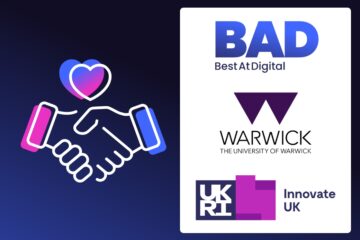University of Warwick research partnership
BAD has been awarded an Accelerated Knowledge Transfer Partnership grant for a groundbreaking research partnership with the University of Warwick and a prominent industry partner. This grant, provided by Innovate UK as part of their focus on accelerating market changing initiatives, will be used to test the real-world application of ‘boosts,’ for delivering better decision making in an organisational context.
With the support of Professor Thomas Hills, a world leading academic partner from the University of Warwick, and in collaboration with a global pharmaceutical enterprise, this initiative will allow us to better assess the impact of these interventions and lay the ground work for more meaningful measurement of outcomes when looking at changing behaviour at scale.
BAD’s Dr Charlotte Hills, Associate & Behavioural Science Consultant explains that ‘boosts’ are short pieces of information that help people to make informed decisions. Traditionally training programmes use outdated models of learning to teach employees what they ‘should’ do. This fails to acknowledge the barriers and human tendencies that prevent people from doing the right thing, and so limits the impact of this type of training and comms. However, behavioural science provides an exciting approach to shaping human behaviour through digital interventions, better training and more precise communications.
By partnering with world leading expert Professor Thomas Hills, BAD hopes to expand the research knowledge in this applied field. Professor Thomas Hills is a Professor of Psychology at the University of Warwick, who has extensive experience in behavioural science, behaviour change, and behavioural influence.
This project will be targeted toward the completion of conflict-of-interest (COI) declarations. COI declarations are a key part of an organisation’s risk management strategy. Encouraging employees to proactively identify and declare potential or perceived conflicts of interest is essential for promoting ethical behaviour, complying with legal requirements, safeguarding reputation, and minimising risks.
Following recommendations by Professor Hills, various ‘boost’ formats will be prototyped and trialled with employees of the global pharmaceutical partner, to measure whether they lead to an immediate increase in conflict-of-interest (COI) declarations. The real world impacts of the study will be measured and allow us to examine how different ‘boost’ formats can affect their salience and improve the likelihood of target groups engaging in a target behaviour.

Dr Elaine Gallagher, working on the measurement of the ‘boosts’ and their statistical validity for inferring behaviour is clear that this could be a real game changer for how BAD and the industry address behaviour change. “We’ll be able to carry out robust testing on our solutions, giving us even better tools for designing solutions, with the evidence to back it up. The outcomes of this grant will put us head and shoulders above our competitors and help us do even more for our customers.”
This opportunity to test a hypothesis in the real world and to provide feedback on the mechanisms of action at play when it comes to ‘boosts’ (or self-nudges) is one that BAD is incredibly excited by. As a company at the forefront of utilising behavioural science to change the way that corporate training and communications are designed and delivered, this provides a huge opportunity to move our industry onto firmer scientific ground and shift conversations around how impact is considered and measured. By using a scientific approach to isolate the intervention’s effect, we aim to begin building more targeted interventions that we can more confidently predict the impact it will have on a population at large, before scaling, giving organisations a much clearer view on the return of their efforts.
BestAtDigital (BAD), a behaviour change agency, has pioneered using broad principles from behavioural science to design training programmes. Andrea Day, CEO, explains “As a company focused on behaviour change, it’s critical to us that we ensure our practice is on firm grounds. This opportunity to be at the forefront of the ‘new wave’ of academic – industry – agency partnership is exhilarating, transformative for our industry and could make a real difference to the lives of working people. Helping them to make better decisions, while helping organisations produce more effective interventions. This is a small step in a radical direction and we’re delighted to be leading the charge.”
Innovate UK is providing an opportunity for smaller scale, but innovative agencies like ours to open the doors to new ways of working, allowing us to potentially transform how business is done by employees at our customers around the world. By leveraging the powerful networks for change that we have already established, including our partnership with the University of Warwick, and by committing effort to proving the effectiveness of ‘boosts’ we’re stepping away from outdated models of learning and training and placing our feet firmly into the future of work – one where scientific evidence is foundational to our practice.



